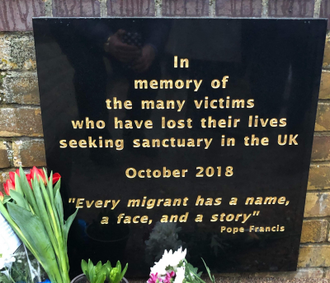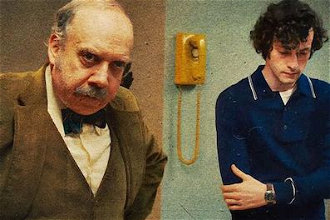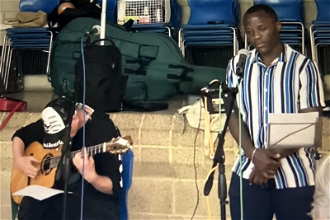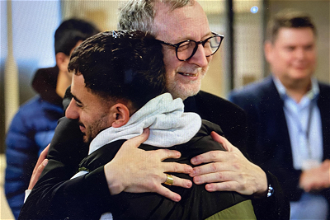Remembering the 58 Chinese found dead at Dover 20 years ago

Refugee Week runs from 15 to 21 June and includes not only UN World Refugee Day on Saturday 20 June, but also the 20th anniversary of the grim discovery of 58 dead young Chinese in a sealed container at Dover docks during the night of 18 June 2000.
This tragedy will be remembered in an event live-streamed from Dover at 11.30am on World Refugee Day.
Prior to lock-down Seeking Sanctuary had hoped to gather people in Dover and remember the Chinese deaths - and the hundreds of others occurring as people seek to reach Britain to claim asylum.
Conforming to the spirit of social distancing, Dr Rose Hudson-Wilkin, Bishop of Dover, will join a tiny live gathering to remember these deaths and all the others occurring as people try to reach the UK. This will take place on the Dover seafront but will also be live-streamed at: https://kentpahirestreaming.co.uk/ and reach a larger remote audience, with a recording later becoming available for more to view.
We hope that, reflecting upon past tragedies, more people will start to imagine how desperate people must be to leave homes and families and take perilous sea journeys. They hope to escape grinding poverty, conflict or famine and reach places where they can seek decent shelter, education and employment. They can then become able to contribute to society and retrieve some sense of dignity, with genuine chances of realising their God-given potential.
Back in 2000, port workers and customs officers were traumatised by the experience. Suspicions of smuggling were aroused because the vehicle, nominally carrying tomatoes, was very recently purchased and cash was paid for the ferry crossing from Zeebrugge. Consequently, after the ferry docked, the lorry coming down the ramps from the ship was stopped at the customs checkpoint.
As one of the team spoke to the driver, another walked to the back and began to unlock the doors. The officer who saw the scene first was "completely traumatised." Another said: "I will never forget the sight that greeted us when we opened the back doors. There were just piles and piles of bodies. It was absolutely sickening. We were also overcome by the most revolting smell." All of them received counselling and needed to take time off work. After international success in identifying the bodies, they were repatriated to China for burial.
The container's air vents had been closed to avoid drawing attention at Zeebrugge and were not opened again on what turned out to be one of the hottest evenings of the year. According to the coroner, some had died in less than two hours while others suffered for five hours before they succumbed to the heat and lack of air. There were just two survivors.
All came from towns in the impoverished coastal region of rural China's south-eastern Fujian province. This is still a hub of human smuggling operations and a hotbed of 'snakehead' activity.
Chinese families have quite commonly paid for sons and daughters to be trafficked to the West and earn money to send back home. Areas of the province are relatively wealthy as a result of previous migrations and the scale of remittances sent back to the area. The exiles and their families are proud to have left Fujian and have a chance of a good life with good money elsewhere. In one of the world's most unequal societies, relative deprivation and the chances of a better life are sufficient to make the risks seem worthwhile.
This in turn, encourages further chain migration. alongside exaggerated notions of the ease of reaching the West and earning money, make the journeys attractive.
A Reuters correspondent visited a Fujian village in 2001 and found it predominantly inhabited by women, as husbands and other male relatives had gone work in southern Asia, America and Europe. It had the nickname of "widows' village". There were colleges teaching "Emigration English" with students reading Orphan in a Foggy Capital, the popular translation of Oliver Twist.
It was clear to see - a building boom was transforming the countryside with temples rebuilt and new garish constructions added by the nouveaux-riches with remittances from abroad. Tall dwellings were topped by satellite dishes and coated in tiles and blue glass, their interiors awash with marble staircases and fancy chandeliers. Filial piety had brought the houses of their dreams to the proud but lonely old people left behind.
Many here imagined that lessons had been learned 20 years ago, but if so they have been forgotten. On 23 October 2019 another sealed and overheated container arrived at Grays in Essex, again from Zeebrugge, and contained the bodies of 39 Vietnamese migrants.
Also on 20 June, the Anglo-French initiative 'People not Walls' will host a virtual 'Zoom' rally from 10.00am to 11.30am, focusing on the plight of unaccompanied minors experiencing human rights abuses near the French coast and embarking upon perilous Channel cross:ing attempts in small boats. Details will be announced soon. This will end with a switch to the live Dover remembrance. All can join for free by registering beforehand at:
www.eventbrite.co.uk/e/keep-children-from-danger-tickets-107546307902?utm_campaign=post_


















